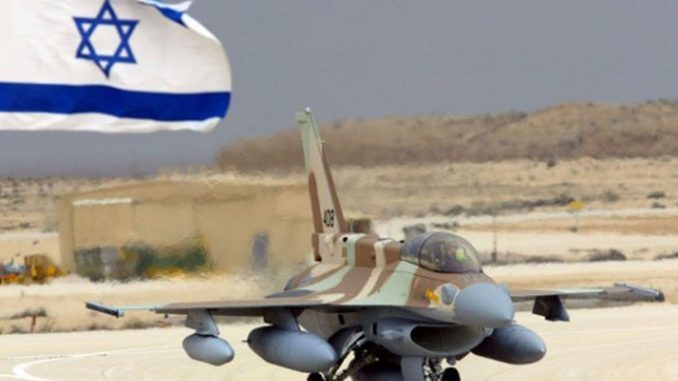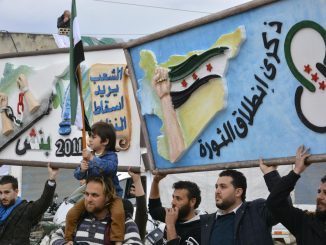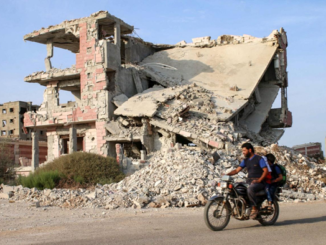
The Israeli air force conducted new airstrikes in Syria against what they described as arms sent for Hezbollah, while the Syrian regime side responded with air defense for the first time in decades.
The Israeli army said its aircraft have carried out several strikes inside Syria, breaking their habit in not mentioning the details of their strikes as they remained silent after each previous attack. These attacks have been so frequent in the last months, adding more tension to the already complicated Syrian situation.
“Overnight aircraft targeted several targets in Syria,” an Israeli army statement said.
Israeli Prime Minister Benjamin Netanyahu said the strikes targeted “advanced” weapons bound for Hezbollah, which is fighting in Syria alongside Assad regime and is considered enemy by Israel.
“Our policy is very consistent,” Netanyahu said. “When we detect attempts to transfer advanced weapons to Hezbollah, and we have the intelligence and feasibility to carry out an operation, we will work to prevent it.”
In response to the strikes, the Syrian government deployed air defense systems and fired a number of missiles towards Israeli jets, Israeli daily Haaretz reported.
None of the missiles struck the jets, the army said, though one of the projectiles was intercepted by Israel’s Arrow missile defense system north of Jerusalem, according to Haaretz.
“Several anti-aircraft missiles were launched from Syria following the mission and (army) aerial defense systems intercepted one of the missiles,” the statement added.
None of the missiles hit their targets, the Israeli army added.
According to the Israeli army, the jets were targeted with Syrian anti-aircraft missiles, of which one was intercepted by Israel’s missile defense system, heard as far away as al-Quds, and two others landed in Israel but caused no damage or injuries. As a result of that, a rocket alert siren was heard in Aravot HaYarden Regional Council in the Jordan Valley, the statement added.
Was an Israeli jet shot?
Assad regime’s army high command confirmed in a statement on Friday that Israeli jets breached Syrian airspace early in the morning and attacked a military target near Palmyra.
The high command described the attack as an act of aggression that aided the Islamic State (ISIS) group, which is fighting against the Syrian government.
It said its air defenses shot down one of four Israeli jets over what it called “occupied ground” and damaged another.
Syrian media reported that four IAF jets took part in the raid, which occurred in the early hours of Friday morning, and claimed to have succeeded in shooting down an Israeli plane and hitting a second one as they were carrying out strikes near the city of Palmyra.
Syria’s SANA state news agency said that the country’s “air defense engaged them and shot down one warplane over occupied territory, hit another one, and forced the rest to flee.”
“This blatant Israeli act of aggression came as part of the Zionist enemy’s persistence with supporting ISIS terrorist gangs and in a desperate attempt to raise their deteriorating morale and divert attention away from the victories which Syrian Arab Army is making in the face of the terrorist organizations,” the statement read.
“Any attempt by the Zionist enemy to attack any part of the Syrian territory will be directly confronted with all possible means.”
However, the Israeli army denied that any jets had been downed, stating that “at no point was the safety of civilians or IAF aircraft compromised.”
There were no reports by the Israeli army of any aircraft lost in the operation.
Jordanian news reports said an “unidentified object” fell from the skies on Thursday night in the northern area of Irbid, after which security forces surrounded the area of impact.
Pictures shared on social media showed what appeared to be part of a missile that had landed in a yard.
It was not clear whether the object was part of missile intercepted by Israel, part of an Israeli missile, or another object.
Previous Israeli airstrikes
On Feb. 22, Syrian media reported that Israeli aircraft targeted Assad regime forces positions near Damascus, including a convoy bearing weapons for Hezbollah group.
According to Arab media, outposts of the Syrian Army’s 3rd Division were targeted in the strikes.
Some were directed toward military positions, while others targeted weapons caches near Ba’albak, in the eastern Qalamoun range, and set alight a Hezbollah convoy, according to the spokesperson, Abu al-Jude al-Qalamouni.
The Hezbollah-affiliated Al-Mayadeen also reported of the strike, saying that it was carried out by two air-to-surface missiles and didn’t result in injuries or substantial damage.
This was the third time in three months the Israeli Defense Force (IDF) has being accused by the Syrian government of targeting Syrian positions from Israeli territory.
In January, Syria blamed Israel for a missile strike on the Mezzeh Military Airport, located in a suburb of Damascus, which was apparently being used as a weapons depot.
Assad regime’s army has warned that there will be repercussions for Israel for the “flagrant attack” on the military base, state TV said, citing a Syrian army command spokesman. It also linked the alleged strike to Israel’s “support of terrorist groups.”
“Syrian army command and armed forces warn Israel of the repercussions of the flagrant attack and stresses its continued fight against (this) terrorism and amputate the arms of the perpetrators,” the army command said in a statement.
There was no information on the death toll resulting from the airstrike immediately available.
Major #Israel airstrikes just targeted Mezzeh Airport outside #Damascus.
One of #Assad regime’s *key* military facilities in the capital. pic.twitter.com/2dSDYhfZHS
— Charles Lister (@Charles_Lister) January 12, 2017
On December 7, SANA reported that “several surface-to-surface missiles” were launched by the IDF from the Golan Heights. At the time, the source in the Syrian armed forces slammed the attack as a “desperate attempt” by Israel to endorse terrorists.
In addition, Israel in the past has targeted positions of Lebanon’s powerful Hezbollah group inside Syria where the Iranian-backed group is heavily involved in fighting alongside the Syrian army.
Israeli defense officials have voiced concern that Hezbollah’s experience in the Syrian civil war, where it has played a significant role and recently helped the Syrian army regain the eastern sector of the city of Aleppo, has strengthened it.
Damascus airport was also hit by air strikes in 2013. Tel Aviv neither confirms nor denies involvement in striking targets inside Syria.
The Syrian crisis began as a peaceful demonstration against the injustice in Syria. Assad regime used to fire power and violence against the civilians and led to armed resistance. 450.000 Syrians lost their lives in the past five years according to UN estimates, and more than 12 million have lost their homes.



